Yuurei are Japanese ghosts and they come in quite a few varieties, from the protecting shugorei to the vengeful and very dangerous onryou.
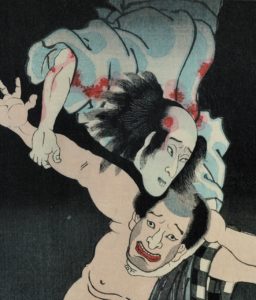
Kahada Koheiji is an example of a male onryou.
Do you believe in ghosts? Let’s go one further. Have you ever seen a ghost?
Maybe you were sitting alone in a room concentrating on a book or a screen and out of the corner of your eye someone walks by, a shadowy figure. Your heart hitches in your chest. You look up and nobody’s there. You look behind you. No one. Yet you’re absolutely sure someone just passed by.
Or perhaps you spent the weekend away, camping with friends. Back in the privacy of your home, you’re looking through all the photos you took, when you come across the selfie of the four of you all gathered inside the tent in the middle of the night, flashlights under your chins for silly effect. Except when you examine the photograph closer you notice there aren’t four people. There are five. There’s another face positioned between you and your best friend. He’s looking up at you, his mouth twisted into a sneer. His hand is on your shoulder.
Or it could be that you come home late. It’s almost midnight. Your partner is visiting their parents and you’re all alone. You want to relax a little before head up to bed. So you turn on the TV and, Oh, look there’s an unmarked video sitting there. This has got to be good. You slide it into your VCR and push play. We know what happens next.
It’s almost Halloween, so let’s do something a little spooky. In this episode of Uncanny Japan let’s talk about Japanese ghosts. Specifically, the various kinds of ghosts you might just run into while living or visiting Japan.
What is a Yuurei/幽霊?
In Japanese the word for ghost is yuurei (幽霊)The first character yuu means faint or dim, while the second character rei (霊) means spirit or soul.
The idea behind yuurei goes something like this: All people have reikon (霊魂) or souls. And when we die these souls need to be helped to move on to the other side. This is done by proper funeral ceremony and practices. That is an entire episode in and of itself, Japanese funerals.
But back to ghosts. If for some reason a person’s reikon doesn’t make it across or otherwise gets stuck, then you get a ghost, a yuurei. Depending on the emotion and the kind of stuck-ness that occurs you get a different kind of ghost.
This all sounds at least a little familiar, I guess.
Joubutsu/成仏 – Attaining Buddhahood
Now the act of moving to this other side is called joubutsu (成仏). It means to attain Buddhahood. But in this case, it’s not what you think. It doesn’t mean someone has spent years in a temple, meditating, shedding all their desires and attachments, to finally reach satori or enlightenment on their deathbed, so that now they can go hobnob with the other Buddhas.
Not exactly.
When talking about death and ghosts, joubutsu just means that when someone dies and the proper ceremonies are performed, that person will be released from this world and can pass into a more comfortable place, like a Buddhist paradise. Although I often hear people talking about deceased loved ones saying that they’ve become a Buddha. I believe the feeling is a little different than what we in the west would consider a Buddha. Or the buddha.
Identifying a Japanese Ghost/Yuurei
Anyway, I think the first thing I ever heard about ghosts in Japan was from an exchange student studying at my university. He said that the difference between Japanese ghosts and other country’s ghosts is the Japanese ones don’t have legs. Not 100% sure, but I think ghosts all over the world have the legless variety, no? That aside, there’s actually a bunch of other more interesting characteristics Japanese spectres possess.
For example, you’ll often find yuurei dressed in an all white kimono. This is because back during the Edo Era the deceased were dressed in an all white before they were buried. Since people didn’t normally go around wearing white kimono, if you saw an image depicted that way, or on stage at a kabuki play, it was a sure bet they were a yuurei. You’ll also find those white-kimono’d ghosts are often wearing a white triangle piece of cloth or paper on their foreheads. This is called a hitaikakushi, “hide the forehead” and is also part of the funeral attire.
While it seems that in Japan women yuurei are more common, you do come across male ghosts, too. They both tend to have long black haired that is all mussed up.
Okay, let’s talk about the different types of ghosts. There are quite a few. I picked a handful of the more common and colorful ones to go into today.
Shugorei/Guardian Ghost
Let’s start off lighthearted with the shugorei(守護霊). These are souls that protect you throughout your life, a guardian spirit, so to speak. It’s said every person has at least one shugorei. But some lucky folk have more. It’s easy to assume that in Japan it’s one’s ancestors who act as the guardian spirits, especially since so much attention is spent remembering and making offerings to these predecessors, but it isn’t always the case. Your guardian spirit or spirits are souls that are similar to yours. They want to help guide you in the right direction, or save you when you’re in a pinch. There. Happy ghosts.
Since we started pleasantly, let’s continue while getting more and more disturbing as we go along.
Doubutsurei/Animal Spirit
Number two, doubutsurei(動物霊)or animal ghosts. The Shinto religion holds that everything has a spirit. Not only humans and rocks and trees, but animals, too. Also, Buddhism doesn’t differentiate between people souls and animal souls. So both of Japan’s main religious are okay with the belief that animals have reikon, souls, and therefore, there are animal ghosts. Which is nice.
Except when they’re not so nice and an animal spirit wants to haunt or posses you. It sounds like foxes and big snakes are often the culprits here. An example of a really bad doubutsurei is kokkuri-san, which is a fox spirit, but when I hear the word kokkuri-san I think Japanese ouji boards and the evil spirits that visit them. I need to do an entire show on kokkurisan, but I have to get my nerve up first.
Something interesting I ran across is that because animals don’t understand well the human language, it’s difficult to do a cleansing ritual, an oharai (お祓い), or exorcism to get rid of them. They just don’t what you’re talking about.
Sourei/Poltergeist
If you’ve ever wondered what a poltergeist is called in Japanese, that would be sourei, (騒霊). Sou is the character for noisy. Noisy spirit.
Fuuyueri/Wandering Ghost
Next, we have a fuyuurei (浮遊霊)the characters for float, play, and spirit, in that order. These are floating or wandering ghosts. They are souls that don’t accept their own death. Either they have died suddenly and don’t realize they’re dead, or they were not psychologically able to accept the fact they were going to die. They do as their name suggests and float and wander around. I read that it’s easy for this type of ghost to attach themselves to a person. So be careful.
Jibakurei/Tied to the Land Ghosts
If they don’t wander so much but stick to a certain area they are called jibakurei(地縛霊)ghosts. Literally, tied to the ground spirits. So people who have died suddenly through war, accidents, disasters and cannot accept the fact they’re dead, but also have some attachment to the spot where they died, are these kinds of ghosts.
Some suicides fall into this category. Think haunted houses, hospitals, bridges, lakes, tunnels, where if you just happen to be there at a certain time of night you might catch sight of them. It’s said it can take a matter of days to hundreds of years for these ghosts to eventually realize they are dead and move on.
Hyouirei/Spirits Who Possess
All right, let’s go a little darker now with the hyouirei(憑依霊) These are ghosts that possess people. Japan, not being a Christian nation, didn’t have the idea of, let’s say the devil possessing a person. The word hyoui, possession, and hyouirei, the spirit that does the possessing wasn’t used until after World War Two.
There were other older ways to say someone was possessed or overcome by something other than satan. Let’s say, a fox. That one’s easy. It’s called kitsune-tsuki. There is also kamioroshi, god coming down; kamigakari, god hanging on; and kamiyadori, god taking up residence. Remember that god isn’t necessarily god that is familiar to the west. There is the god of smallpox, which wasn’t a good guy by any stretch. Think more powerful entity, perhaps.
Okay, the last two are the doozies.
Onryou/Wrathful Ghost
The first one is an onryou(怨霊)or vengeful spirit. These are people who were treated horribly and died a violent death as a result. Overcome with some negative emotion like hate, jealousy, desire, revenge. Anything from spurned lovers, driven to suicide to those who have been tortured and then murdered. Whatever it was, these poor souls contain so much hate and wrath that they are able remain in this world in order to exact their revenge. They are extremely powerful and are capable of killing or causing their still-among-the-living enemy’s death. Needless to say, onryou are extremely dangerous.
They might sound familiar. Onryou are very often the antagonists in J-Horror. Have you ever seen the movie The Grudge/Juon in Japanese? How about Ring? Well, both Sadako and Kayako are onryou.
Older examples: remember Oiwa from episode 42, Yotsuya Kaidan (The Ghost of Oiwa), and Bancho Sarayashiki: Okiku and the Nine Plates episode 25. These are two very famous Japanese female yuurei and they are also both onryou.
The final type of ghost today blew my mind when I first heard about it.
Ikiryou/Living Ghosts
First off, this dangerous phenomena is called an ikiryou(生き霊), or living spirit and what makes them special is that they aren’t dead. More specifically, they are the spirits of living people who are extremely envious or resentful of another person. We’re talking festering, all encompassing hate or jealousy that causes their soul or part of it, to leave their body and torment their enemy. Oftentimes, the person who owns the tormenting spirit isn’t even aware this is happening.
This idea is nothing knew, it was part of the plot in the Tale of Genji and has been written about, acted out on stage, and depicted in art ever since.
In some cases this bundle of emotion appears in some kind of form, for example it could resemble the person to whom it belongs, or a ball of fire, or even a floating head. But other times it’s completely invisible, maybe just turning the tormented person’s luck bad or making them ill.
How I learned about the ikiryou? Many years ago, after several years and much difficulty, I was finally able to get pregnant, and when I found out I wanted to tell everyone. A lot of my friends and family were worried and I wanted to share the good news. Of course I told my mother-in-law. But she quickly put the kibosh on me telling anyone else.
Her explanation was that until the second trimester started the baby was still in this delicate ethereal state and if I were to go around telling everyone, bragging, someone who didn’t like me, or perhaps who they themselves couldn’t get pregnant, might get jealous and that jealousy could very well mix with resentment and a strong spirit, and present itself as an ikiryou, that would come and hurt the child, or cause me to miscarry. Alrighty then.
Another example of ikiryou is ushi no koku mairi, which I talked about back in episode 52, Putting a Curse on Your Enemies. If you haven’t listened to that, it’s nice and spooky. Also, you can see the lengths people go to to curse someone. That’s some serious dark energy there.
Oharai/Cleansing Ritual
For all the above mentioned ghosts, except the guardian spirit, you can rid yourself of an akuryou, or bad ghost by getting an oharai. I mentioned it earlier. An oharai is a kind of a cleansing ceremony. The person who performs it actually helps the ghostly spirit to joubutsu suru, detach from this world and find peace on the other side.
A final interesting thing about vengeful Japanese ghosts and how to tell if they really are vengeful Japanese ghosts. They have a cool catchphrase. Urameshiya. Basically it means, I curse you. A living person would never say this. There’s a different way to curse someone if you want to do that. So the word urameshiya is only used by angry ghosts out to do no good. So if you ever hear someone spookily calling urameshiya, that’s probably a good time to go get an oharai.
Extra Story for Patrons
So that’s all for today. Since it’s October and Halloween is near. I wanted to do something special for my patrons. You see, I’m old enough to have had a lot of weird and scary stuff happen to me throughout the years. There are a couple things though that are straight up terrifying. One of the stories I’ve never really talked about before is a little hair raising. So I’m going to record that and put it up for all my patrons. I don’t particularly like revisiting it. But I love good story and this really is a good story.
Okay, that’s all for tonight. It’s time to go to sleep. Go on now. Remember to check your closets and look under your bed. Don’t think too much about that wind outside, that creaky gate.
Sweet dreams and remember if you bolt awake in the middle of the night because you think you’ve heard a sound, just close your eyes.
Don’t think about the footsteps coming down the hall, or your door slowly opening.
Don’t pay attention to the movement of your blankets, or the icy hand sliding up under the sheets
Keep your eyes closed tight.
Is that a putrid breath in your ear? Something brushing against your cheek?
She wants you to see her.
Whatever you do don’t open your eyes!
Credits
Intro and outro music by Julyan Ray Matsuura

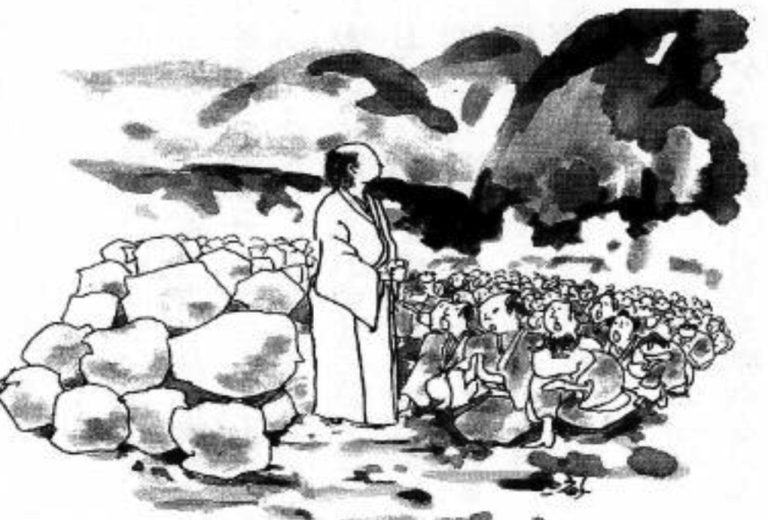
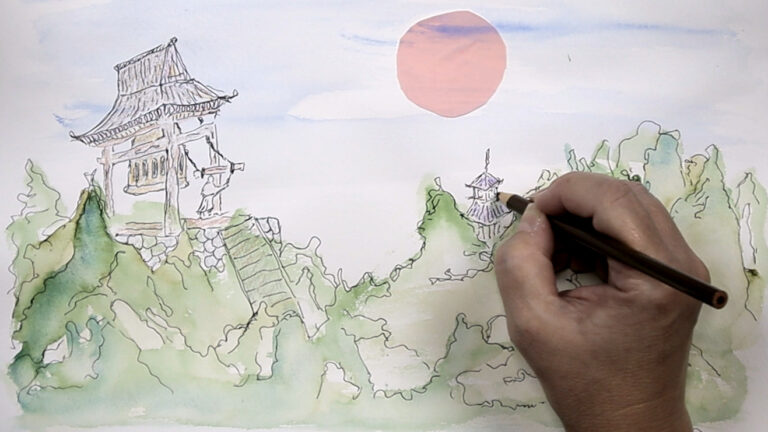
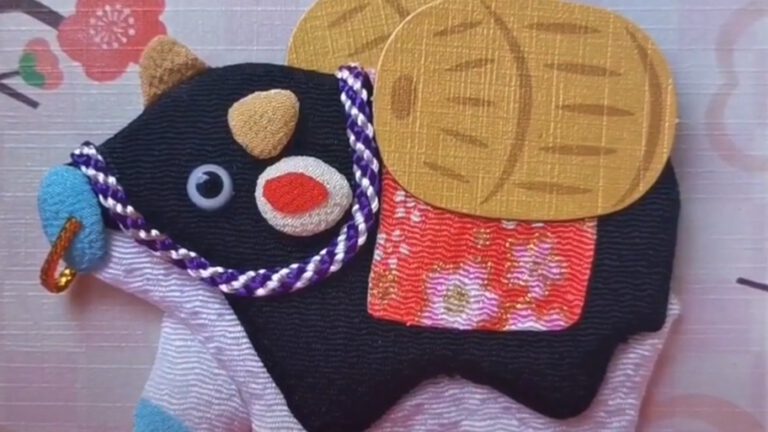
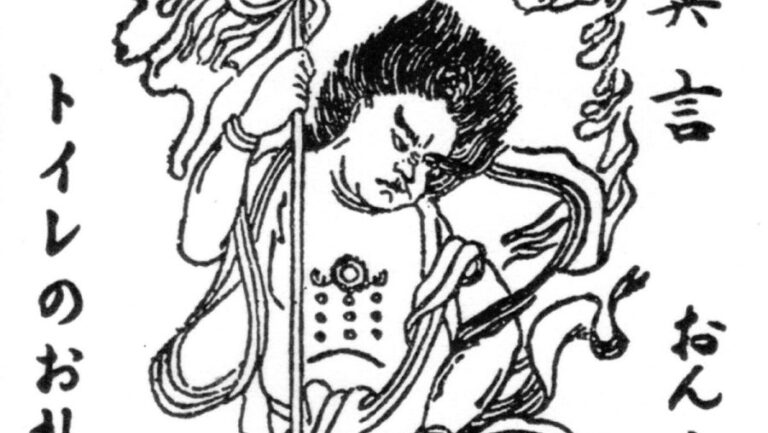


this is a good story
I’ve been listening to your podcast on apple podcasts for quite a while now (maybe 2-3years), and I just today learned that you have transcripts available. Meaning I get to see the relevant kanji! Super cool!!!
Thank you for this wonderful gem of a show. 🙂
Paul, thank you so much for listening to the show (and for so long, too!). I always wondered if anyone wanted to see the transcripts and kanji or not. Now that I know your reading, I feel more inspired to continue. ^^d
You can see the transcript for every episode by clicking here in the IOS Podcasts app.